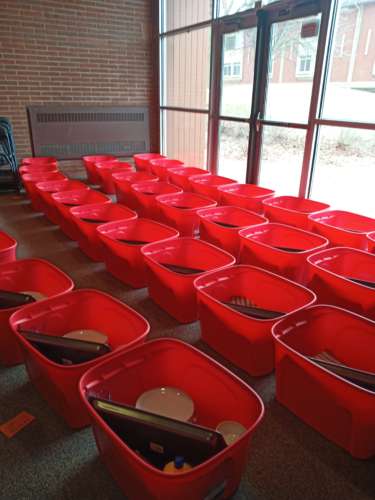
With food security being a concern during the COVID-19 pandemic, the University of Guelph is focusing efforts to help ensure its students and local community have access to affordable food.
U of G’s Hospitality Services donated $32,000 worth of food to local food banks last week and put together 75 food hampers to be delivered this week to students still living in residence.
“Hospitality Services accumulated a significant amount of food because a majority of our students living in residence quickly moved out,” said Ed Townsley, executive director of Hospitality Services. “Some of this food was perishable and needed to be consumed quickly so we decided to donate it to various local food banks in the city.”
The University has also established a COVID-19 Food Security Working Group of students, faculty and staff to address food security concerns of U of G students and the broader community.
“U of G students are doing their part to stay home and maintain safe social distancing to prevent the spread of the novel coronavirus in our community,” said Carrie Chassels, vice-provost (student affairs). “Like so many others, our students have suffered a significant loss of income and are finding it difficult to cover their basic costs of living. We have set up this working group to develop longer term plans that will ensure food security for our students and for our local community during these times of uncertainty.”
The Guelph Student FoodBank, a student-operated food bank on campus, has a long history of supporting students and their dependents by providing food and other essentials. Over the past two months, more than 420 students and their 320 dependents received support from the Guelph Student FoodBank. The food bank recently closed its building due to public health recommendations about physical distancing and is working with the University to establish an alternative process for providing food bank support for students.
One goal of the working group is to develop a plan for delivering funds and food items to those in need, given that the food bank’s physical site isn’t currently operating.
“We are especially concerned with providing for students still in residence, international students and their families and those in family housing. We are also working to devise a way to deliver grocery cards,” said Clarissa Shepherd, Guelph Student FoodBank coordinator.
While a majority of students were able to leave campus residences when COVID-19 prevention measures were implemented earlier this month, some 170 students living on campus were unable to return home for various reasons. As well, more than 300 students and their families are living in the University’s family housing units as yearly leaseholders.
“The group of students remaining on campus includes international students and others who, for a variety of reasons, had nowhere else to go,” said Irene Thompson, director of Student Housing. “We are ensuring these students not only have suitable food and housing, but we are also providing them with support through virtual connections and programming to help with the feelings of anxiety and isolation.”
Students living in traditional on-campus residences were recently moved to the townhouse residences on campus, where they now have access to kitchens.
With the help of alumni donations, Student Housing provided students in residence with kitchen supplies, so they no longer have to rely on more expensive prepackaged foods.
“Given many students were using meal plans and eating prepared meals on and off campus, they didn’t have kitchen supplies,” said Thompson. “We didn’t want to put additional financial or emotional strain on our students, so we decided to supply them with cooking utensils.”
Alumni Affairs and Development (AAD) helped fund kits made up of necessary kitchen supplies through alumni donations to the University’s Highest Priority fund. The funding supports emerging opportunities and urgent needs across the U of G campus, said Lisa Hood, associate director, annual fund.
“It offers the president and administration the flexibility to respond quickly at times like this, as well as with whatever the emerging needs are in six weeks or six months, which is important at a time of such rapid change,” said Hood.
The working group has reached out to AAD and donors to the Highest Priority Fund to request additional resources to support the increased financial needs of students through contributions to the Guelph Student FoodBank and the University’s financial aid fund.
While the pandemic has likely increased the number of students experiencing food insecurity, high rates of food insecurity existed among students before the crisis, said Prof. Philip Loring, a member of the working group.
“A lack of income is the principal determinant of food insecurity,” said Loring. “This is why financial support is vital. Emergency food provision is only a short-term solution to the problem of student food insecurity.”
Anyone wishing to support the Highest Priority fund can donate online at www.uoguelph.ca/giving.
Students needing assistance can connect with the Guelph Student FoodBank by emailing foodbank@uoguelph.ca.